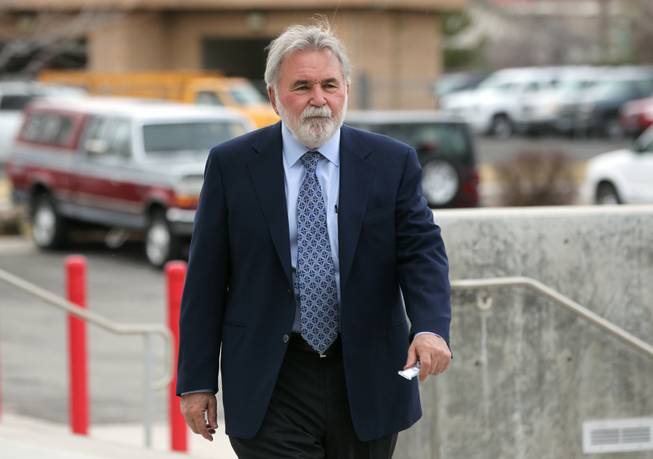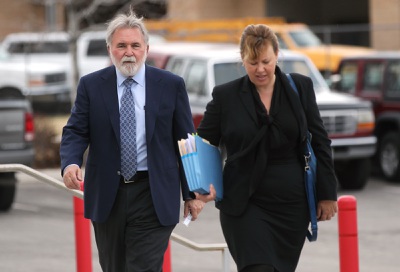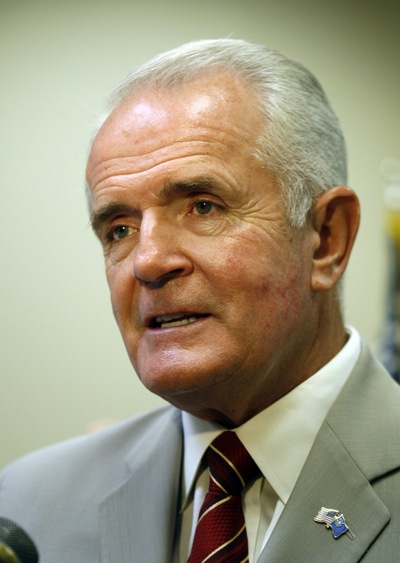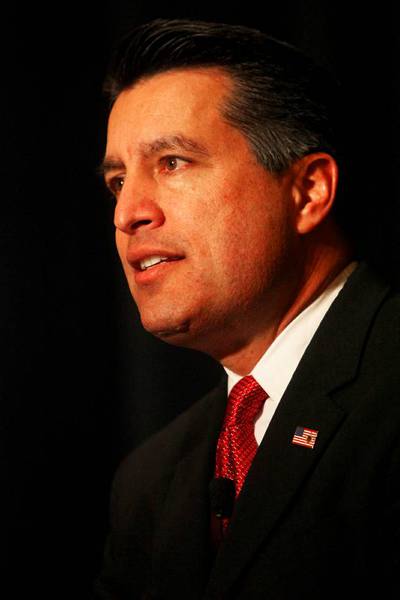
Catherine Allison
Monte Miller, 65, sees the state in a near constant fight over the past decade between those who value free enterprise and the forces of government.
Friday, April 27, 2012 | 2 a.m.
Sun coverage
The businessman in the blue suit, distinguishable mostly by his full silver beard, sat in the Carson City courtroom earlier this month, leaning back in the chair. He wore no expression as the judge threw out the gaming tax initiative he had backed with his own money.
You don’t take on gaming in Nevada and expect to win every fight.
And besides, by Monte Miller’s reckoning, he had already won.
Gaming and mining had backed away from an initiative to raise $1 billion through a tax on business profits, seeming to doom it to the large cemetery of Nevada tax plans that have gone nowhere. Scuttling their support for the business tax had been Miller’s motivating force in pushing ballot initiatives to raise taxes solely on those industries.
Few in Nevada know Miller — either by name or by sight. When he emerged from former Gov. Jim Gibbons' office on the eve of a key speech the governor was about to deliver, even some of Carson City’s political elite had to ask his name.
But in the decade-long tax fight that has pit Nevada’s largest industry and unions against much of the rest of the state’s business community, Miller has been a quiet crusader against government taxes and spending.
And in his battle — through contributing to campaigns, funding conservative organizations, cultivating relationships with key elected officials and now through threatening ballot initiatives — Miller has become perhaps the most influential conservative in the state.
Miller’s overarching goal has been to keep Nevada taxes low and prevent a corporate income tax.
In his view, it’s a policy that will benefit the state, making it a magnet for other businesses scared off by high-tax states.
It is also a policy that’s key to his own business, which convinces corporations to incorporate subsidiaries in Nevada to take advantage of its low-tax, business-friendly environment.
“Government always wants more money. It would always like more money to spend on something. There’s always a good idea to spend more money on, from both Democrats and Republicans,” Miller said in a recent interview.
He spit out the opposing argument this way: “Take it from the private sector; give it to government.”
Miller, 65, sees the state in a near constant fight over the past decade between those who value free enterprise and the forces of government.
Over the years, Miller has wielded his influence strategically — an effort that has won him a seat at the major policy discussions in Nevada.
Miller, for example, was perhaps the only person besides the state budget director inside the governor’s office on both days of the State of the State addresses, with Gov. Jim Gibbons in 2009 and Gov. Brian Sandoval in 2011.
Miller has been a prodigious fundraiser and ambassador for Sandoval with conservative groups. He gives to conservative Republican legislative candidates, both incumbents and fiscally hawkish upstarts facing Democrats or Republicans who have supported policies that, in his view, hurt the business climate in Nevada.
In 2011, Miller, his wife Susan, and his company, KeyState Corporate Management, gave $58,000 to candidates, all Republicans, except for Clark County Commissioner Steve Sisolak, who has taken on firefighter salaries.
“He doesn’t just write you a check,” said Robert Uithoven, a Republican political consultant who has advised Miller. “He wants to understand what you believe and why you believe it.”
Miller, a graduate of both UNR and UNLV, sits on the boards of the state’s most prominent conservative groups, including the Nevada Policy Research Institute, the Nevada Taxpayers Association and the Keystone Corporation, a group of business leaders who believe in keeping taxes low.
“He has helped shape the direction of the institute,” said Andy Matthews, president of the Nevada Policy Research Institute, the free market think tank whose research and articles are widely quoted by Nevada media and frequently cited by Republican lawmakers. “He has been a particularly active board member.”
Still, Miller is a somewhat unknown figure outside those small circles. He declines speaking invitations and honors, Uithoven said.
“Every year his name is brought up as a person to honor,” Uithoven said. “He turns it down every time.”
Miller believes the key to Nevada’s economic survival is its unique tax environment.
“What’s really, really important is we’re one of three states without any income tax,” Miller said last month in an interview. “It makes us stand out. It makes us special. ... Nevada differentiates ourselves by not having any income tax. It’s a place the wealthy want to come. They create jobs; they create tax revenue.”
Protecting Nevada’s tax environment will help Nevada recover from the economic devastation.
It’s also important for Miller’s business success.
His business, KeyState Corporate Management, has 25 employees, he said. Under the state’s current tax structure, which is based on employment, his burden on taxes is relatively low compared with companies that are labor intensive, like grocery stores or casinos.
Another incentive for him preventing a tax is his business model.
One of KeyState’s primary businesses is to help companies form subsidiaries and park “intangible assets” — like patents, trademarks and intellectual property — in Nevada and Delaware. Both states are prime territories for such activities because of their business-friendly tax and legal environments.
KeyState then manages the subsidiaries.
But Miller makes no apologies for the fact his public policy mission coincides with his personal financial business.
“A huge part of the intangible business would go and move if we had an income tax,” he said of the industry that employs an estimated 50,000 people in Nevada, including lawyers and accountants.
“He could be selling Slurpees at 7-Eleven and he would have the same beliefs he has,” Uithoven said. “Does it benefit him? Certainly. It benefits everyone else, too. These issues are Monte Miller to the core. It’s what makes him who he is.”
Miller first emerged as a player in state policy in 2003, when he took an active role in the fight over a broad-based business tax.
To defeat the tax, which was backed by gaming, Miller funded phone calls to voters inside lawmakers’ districts and took out radio ads against the tax.
Ultimately, in a compromise, the Legislature raised revenue by creating a tax on payrolls — called the modified business tax.
Many in the political establishment, including gaming, hate the payroll tax. But Miller sees nothing wrong with it.
“It touches every business. There’s a nexus to the amount of services their employees use,” he said.
The peak of Miller’s influence likely came in 2008, when he became known as the “shadow governor.”
Miller had become close to Gibbons during the 2003 tax fight. He threw the then-congressman’s first fundraiser when he ran for governor.
After Gibbons won, members of his inner circle began to abandon him in the wake of personal scandals and distractions.
Not Miller.
At the nadir of Gibbons’ implosion, Miller declared Gibbons would go down as one of the greatest governors in Nevada history.
In 2008, Miller sat in with the governor’s top staff, helping make decisions about the state budget — big decisions, like what percent pay cut state employees should take.
The political establishment regarded Miller’s influence during the Gibbons administration as an anomaly — chalking it up to his relationship with a governor who tended to delegate much of the decision-making to others.
But when Sandoval resigned from the federal bench to challenge the incumbent governor, Miller reached out to Sandoval, through supporters. After urging Gibbons not to run again — advice Gibbons ignored — Miller threw his support behind Sandoval and became a major fundraiser for him.
The support preserved Miller’s influence, which is significantly more conservative than other Sandoval advisers.
Still, his influence with Sandoval is significantly diminished compared with Gibbons. Sandoval, for example, didn’t consult Miller before deciding last year to extend the temporary 2009 tax increases. He only called Miller after the fact.
Sandoval confirmed Miller is not in his inner circle of advisers.
“I don’t mean that disrespectfully to him in any way,” Sandoval said in February. “He’s a friend.”
After Miller filed his tax petitions, he approached Sandoval.
“He followed me into the hallway after the event to let me know what he was doing,” Sandoval said. “He knew the fact that I wouldn’t support it.”
But Miller has close ties to Senate Republican leadership, including Sen. Michael Roberson, R-Las Vegas, who’s likely to lead that caucus.
Miller said he supports the positions by Sandoval and Roberson to extend the taxes for another two years.
“Every day I think it’s a better decision,” he said.
But he still bristles at the increase in the payroll tax lawmakers passed in 2009, over Gibbons’ veto.
“I support extending the taxes now,” he said. “I told the governor I support it. I get it. I understand it,” he said. “But in 2015, I want a reprieve on this.”




Join the Discussion:
Check this out for a full explanation of our conversion to the LiveFyre commenting system and instructions on how to sign up for an account.
Full comments policy